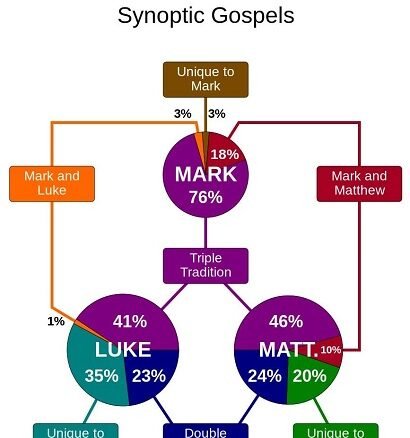If you have ever read the first three Gospels in the New Testament, you do not have to be a scholar to notice that Matthew, Mark, and Luke are like one another. In fact, Matthew, Mark, and Luke are so similar that they have been called the “Synoptic” Gospels which comes from a Greek word meaning “seen together”.
Mark has a total of 661 verses and about 90% have some parallel in Matthew and about 65% of Mark’s verses are paralleled in Luke. In addition, there are about 230 verses that Luke and Matthew have in common that don’t appear in Mark.
Most scholars are convinced that the Synoptic Gospels are copying one another. It is difficult to explain the similarities in wording, similarities in order, similarities in parenthetical notes, and similarities in Old Testament quotations without posting some theory of literary dependence. So, who copied who?
Mark’s gospel has about 660 verses, all but twenty or so of which reappear in Matthew and Luke. Matthew reproduces almost 600 of Mark’s verses and Luke about 300.
The Synoptic Gospels don’t tell the same version of all their stories. But there are strong similarities among them that set them apart from John. It has long been known that the reason they agree on so much is that they all shared the same sources.
Both Matthew and Luke, for example, used Mark, reproducing it verbatim in places and changing it—sometimes changing it a lot—when they wanted to tell the stories in different ways.
Let us see Few Examples of these:
The incident of Jesus and the question of eternal life.
As Jesus started on his way, a man
ran up to him and fell on his knees before him.
“Good teacher,” he asked, “what must I do to inherit eternal life?” “Why do you call me good?” Jesus answered. “No one is good—except God alone.” (MARK 10:17-18)
Just then a man came up to Jesus and asked, “Teacher, what good thing must I do to get eternal life?” “Why do you ask me about what is good? “Jesus replied.
“There is only One who is good. If you want to enter life, keep the commandments. (MATTHEW 19:16-17)
Matthew seems to have been troubled by the implication of the statement “Why do you call me good?” and therefore re-phrased it (very slightly) to “Why do you ask me about what is good” so as to avoid the difficult implication that Jesus might be admitting to not being wholly ‘good.
The purported last words of Jesus on the cross.
And at three in the afternoon Jesus cried out in a loud voice, “My God, my God, why have you forsaken me?” (MARK 15:34)
Jesus called out with a loud voice, “Father, into your hands I commit my spirit.” (LUKE 23:46)
The Gospels of Mark and Luke record the last words of Jesus. In Mark, Jesus utters the blasphemous words of despair “My God, my God, why have you forsaken me?” Luke’s account deletes these troubling words and replaces them with the far more submissive statement “Father, into your hands I commit my spirit.”
Christians over the years, the vast majority of people are unaware of such changes. This is not surprising, because the Gospels are typically read in a vertical fashion. It’s only when you read them horizontally, comparing the accounts with each other side by side, that the changes become apparent.
Evidently, the authors of the Gospels were sometimes troubled by one another’s depictions of Jesus and his disciples and made changes accordingly.
These examples are important because they have serious implications for the doctrine of divine inspiration. The copying and modification
between the Gospel authors implies they didn’t consider one another’s writings to be inspired; otherwise, they wouldn’t have omitted material, added their own and revised the wording. Even if one rejects the evidence for literary inter dependence, we still have the problem of the significant differences between the Gospel accounts.
If the authors were writing under divine inspiration, then wouldn’t God have inspired them to record the same details
We must conclude that the Gospel accounts themselves were not divinely inspired, but rather very human endeavours.
Allah knows Best.
_______________________________________
References:
1. Abu Zakaria – (Jesus, man, Messiah)
2. Synoptic gospels Wikipedia
3.Jesus, Interpreted: Benedict XVI, Bart Ehrman, and the Historical Truth of the Gospels
4. Synoptic Gospels – (Bible encyclopedia)
—
Almighty Allah is the highest and most knowledgeable, and the attribution of knowledge to him is the safest.
Right from Almighty Allah and wrong from me and Satan
Prepared by Mohamad Mostafa Nassar- Australia.
Make sure to copy and email this post for your reference, you might need it later.
Arrogance is not only a sign of insecurity, but also a sign of immaturity. Mature and fully realised persons can get their points across, even emphatically without demeaning or intimidating others.
